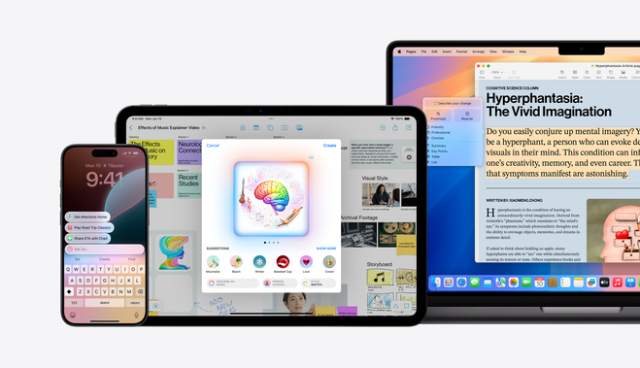Security and privacy are hallmarks of Apple Intelligence

Apple Intelligence is the personal artificial intelligence system for iPhone, iPad, and Mac that combines the power of generative AI models with personal context to deliver intelligence that’s incredibly useful and relevant.
Apple Intelligence is deeply integrated into iOS 18, iPadOS 18, and macOS Sequoia. It harnesses the power of Apple silicon to understand and create language and images, take action across apps, and draw from personal context to simplify and accelerate everyday tasks.
With Private Cloud Compute, Apple sets a new standard for AI privacy, with the ability to flex and scale computational capacity between on-device processing and larger, server-based models that run on dedicated Apple Silicon servers.
Apple Intelligence — the collective brand name for all of Apple’s own AI tools — is intended to be more of a personal assistant than anything else, with an emphasis on “personal.” It takes in specific information about your relationships and contacts, messages and emails you’ve sent, events you’ve been to, meetings on your calendar and other highly individualized bits of data about your life. And then it uses that data to, Apple hopes, make your life a little easier — helping you dig up a photo you took from that concert years ago, finding the right attachment to put on an email, or ranking your mobile notifications by priority and urgency.
But while Apple Intelligence might know that you went on a hiking trip last year, it will lack what company executives called “world knowledge” — more general information about history, current events and other things that are less directly linked to you. That’s where ChatGPT comes in. Users will be able to have Siri forward questions and prompts to ChatGPT — on an opt-in basis — or have ChatGPT help you write documents within Apple apps. Apple said it plans to integrate with other third-party AI models eventually, too. The integration essentially removes a step to accessing ChatGPT and gives Apple users a more seamless onramp to that platform.
As part of its agreement with Apple, OpenAI made an important concession: OpenAI agreed not to store any prompts from Apple users or to collect their IP addresses — though all bets are off if you consciously decide to log in and connect an existing ChatGPT account. Some users might choose to do that to take advantage of their ChatGPT history or the benefits associated with ChatGPT’s paid account plans.
Apple can run computations on sensitive data while ensuring that nobody, not even the company itself, can tell what data is being processed or what computation is being done. Known as Private Cloud Compute, Apple’s new architecture borrows certain hardware and security concepts from the iPhone, including the Secure Enclave that already protects sensitive user data on Apple mobile devices.
Support MacDailyNews at no extra cost to you by using this link to shop at Amazon.
MacDailyNews Take: Only Apple, thanks to the control it has over its entire ecosystem (from custom Apple Silicon to its operating systems and services), can deliver privacy-focused AI with Apple Intelligence.
(As opposed to, say, Samsung Stupidity .)
Please help support MacDailyNews. Click or tap here to support our independent tech blog. Thank you!
Support MacDailyNews at no extra cost to you by using this link to shop at Amazon.
The post Security and privacy are hallmarks of Apple Intelligence appeared first on MacDailyNews.



